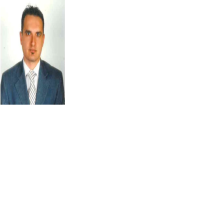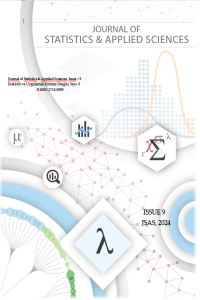Research Article
Issue Editorial Board






Issue Reviewers








Aim & Scope
The Journal of Statistics and Applied Sciences is to publish clear and accessible articles on methods developed for real-life problems and have a wide scientific impact. The journal publishes original research articles. In general, original research reports should present one or two difficulties in a field, including relevant data, present a new method to solve the difficulties, and show that the proposed method answers questions that were previously not answered correctly or best with relevant current methods. It is published twice a year.
Articles submitted to the journal must not have been published elsewhere or sent for publication.
Publications to be produced from graduate theses must be at least three years from the time the thesis is published.
JOURNAL OF STATISTICS AND APPLIED SCIENCES covers interdisciplinary studies involving the application of statistical science, especially topics covering the branch of statistics.
1. Science Mathematics and statistics
- Statistics
- Actuarial
- Biostatistics
- Demographics
- Statistical Analysis
- Statistical Design of Experiments
- Statistical Quality Control
- Probability and Stochastic Processes
- Sampling Theory
- Theoretical Statistics
- Applied Statistics
- Artificial Intelligence
2. Computer Science and Engineering
- Algorithms and Theory of Computation
- Information Security and Cryptology
- Information Systems
- Big Data
- Human-Computer Interaction
- Decision Support Systems
- Data Mining
- Artificial Learning
- Artificial Intelligence
3. Environmental Sciences and Engineering
- Clean Production Technologies
- Renewable Energy Sources
4. Electrical and Electronics Engineering
- Information and Coding Theory
- Electric Energy and Power Systems
- Decision Support Systems
- Digital Design
5. Industrial Engineering
- Ergonomics and Human Factors Management
- Transactions Management
- Quality Management
- Decision Support Systems
- Decision making
- Optimization
- Risk Management
- Simulation
- Artificial Learning
- Operations Research
6. Energy Systems Engineering
- Solar Energy Systems
- Wind Energy Systems
7. Food Science and Engineering
- Food Science
8. Civil Engineering
- Project Management
- Risk Management
- Numerical Modeling
9. Mechanical Engineering
- Numerical Analysis
- Production Technologies
- Product Design
10. Health Sciences
- Health Economics
- Health Management
11. Social, Humanities and Administrative Sciences
-Nicel Decision Methods
- Multi-Criteria Decision Making
- Statistical Analysis and Applications
- Decision Support Systems
- Operations Research
- Time Series Analysis
- Econometrics
- Health Management
- Production and Operations Management
- Innovation Management
- Operation Strategy
- Supply Chain Management
- Technology Management and Business Models
Author Guidelines
Within the scope of the journal, original research articles in Turkish and English in all branches of Social Science and Engineering Sciences and book reviews are published. Articles are processed through the Journal of Statistics and Applied Sciences Dergipark system. Authors are entirely responsible for the scope and content of the articles. The submitted article should not have been published in another journal and should not be at any stage. By sending the article to the journal, the authors are deemed to have accepted that the article has not been published elsewhere before. Articles sent to the journal must have a Turkish or English abstract. In the abstract part, it should briefly include the titles of introduction, material and method, results and discussion. Authors who submit articles for evaluation and referees who evaluate the article are deemed to have explicitly accepted the journal's spelling rules.
Use "IEEE" reference style for bibliography. Use the free Mendeley or Zotero program for reference representation in the article.
In addition to the article, contact information and ORCID information of the author should be sent. In addition, the copyright transfer form should be scanned and uploaded to the system after being filled by the responsible author.
For all kinds of research conducted with qualitative or quantitative approaches that require data collection from participants with any technique, a certificate of conformity should be obtained from the ethics committees of the universities and relevant information should be presented with the article.
The writing rules of the article are presented in detail in the template you can download from the link below. If you do not understand, please contact via e-mail.
- Click here for the research article Turkish template.
- Click here for the research article English template .
- Click here for the copyright form Turkish template.
- Click here for the copyright form English template.
Ethical Principles and Publication Policy
JOURNAL OF STATISTICS AND APPLIED SCIENCES is based on the Code of Conduct and Best Practice Guidelines issued by COPE (Committee on Publication Ethics). It is the duty of the Editors to follow the Cope Guidance for Editors. The COPE Ethical Guidelines for Peer Reviewers are followed by the journal reviewers.
All submitted manuscripts must be original, unpublished and not under review in another journal. Each manuscript is double blinded by one of the editors and at least two reviewers. Plagiarism, duplication, pseudo-authorship/ denied authorship, research/data fabrication, article slicing, sliced publication, copyright infringement and concealment of conflict of interest are considered unethical behavior.
All articles that do not comply with accepted ethical standards are removed from publication. This includes manuscripts that contain possible irregularities or improprieties detected after publication.
Research Ethics
The journal upholds the highest standards of research ethics and adopts the international principles of research ethics defined below. It is the authors' responsibility to ensure that manuscripts comply with ethical guidelines.
- The principles of integrity, quality and transparency must be ensured in the design, review of the design and conduct of the research.
- The research team and participants should be fully informed about the purpose of the research, its methods and its anticipated potential uses, and the requirements and risks, if any, of participating in the research.
- Confidentiality of information provided by research participants and confidentiality of respondents must be ensured. The research should be designed to protect the autonomy and dignity of the participants.
- Research participants should take part in the research voluntarily and should not be under any coercion.
- Harm to participants should be avoided. The research should be planned in a way that does not put participants at risk.
- Research independence must be clear and explicit; any conflict of interest must be stated.
- In experimental studies, written informed consent must be obtained from participants who decide to participate in the research. Consent must be obtained from the legal guardian of children and those under guardianship or those with confirmed mental illness.
- If the study will be conducted in any institution or organization, approval must be obtained from this institution or organization that the study will be conducted.
- In studies with a human element, it should be stated in the "method" section that "informed consent" has been obtained from the participants and ethics committee approval has been obtained from the institution where the study is conducted.
Responsibility of Authors
It is the responsibility of the authors to ensure that the articles comply with scientific and ethical rules. The author must ensure that the article is original, has not been previously published elsewhere and is not under consideration for publication elsewhere, in another language. Applicable copyright laws and treaties should be observed. Copyrighted material (e.g. tables, figures or large quotations) should be used with appropriate permission and acknowledgment. The work of other authors, contributors or sources cited should be used appropriately and cited in the references.
All authors must have made a direct academic and scientific contribution to the submitted manuscript, where an "author" is considered to be someone who has made a significant contribution to the conceptualization and design of the published research, the acquisition, analysis or interpretation of data, and who has been involved in writing the manuscript or in critically reviewing it for content. Other conditions for being an author are planning executing and/or revising the work in the article. Funding, data collection or general supervision of the research group alone does not confer authorship. All individuals cited as authors must meet all the criteria listed above, and any individual who meets the above criteria may be cited as an author. The order of authors' names should be a joint decision. All authors must indicate the order of authorship on the Copyright Agreement Form.
All individuals who do not meet the criteria for authorship but have contributed to the study should be listed in the "acknowledgments/information" section. Examples of these include those who provided only technical support, helped with the writing, or provided only general support, financial, and material support.
All authors should declare any financial relationships, conflicts of interest, and competition of interest that have the potential to influence the results of the research or the scientific evaluation. If an author identifies a significant error or inaccuracy in his/her published manuscript, he/she has the responsibility to immediately contact and cooperate with the editor for correction or retraction.
Editor and Reviewer Responsibilities
The editor-in-chief evaluates manuscripts independently of the ethnicity, gender, sexual orientation, nationality, religious beliefs and political philosophy of the authors. Ensures that manuscripts submitted for publication undergo fair double-blind peer review. Guarantees that all information about submitted articles remains confidential until the article is published. The editor-in-chief is responsible for the content and overall quality of the publication. He/she should publish an error page or make corrections when necessary.
The editor-in-chief does not allow conflicts of interest between authors, editors, and reviewers. He/she has full authority to appoint reviewers and is responsible for making the final decision on the articles to be published in the Journal.
Reviewers should have no conflicts of interest with the authors and/or financial supporters of the research. They should make an unbiased judgment at the end of their evaluation. They should ensure that all information regarding submitted manuscripts is kept confidential and report to the editor if they notice any copyright infringement or plagiarism on the part of the author. If the referee does not feel qualified to review the manuscript or is unlikely to be able to provide timely feedback, he/she should inform the editor and ask him/her not to involve him/her in the review process.
During the review process, the editor should make it clear to reviewers that manuscripts submitted for review are the private property of the authors and that this is a privileged communication. Reviewers and editorial board members may not discuss articles with other individuals. Care should be taken to keep the identity of the reviewers confidential. In some cases, at the editor's discretion, the reviewers' comments on the article may be sent to other reviewers who commented on the same article to enlighten the reviewers in this process.
Price Policy
Processing and publication are free of charge with the journal. There is no article processing charges or submission fees for any submitted or accepted articles.
Indexes
Journal Boards
Owner

Editor-in-Chief

Associate Editors

Section Editors





Lisans Eğitimi: İstanbul Üniversitesi İşletme Fakültesi İşletme Bölümü
Yüksek Lisans Eğitimi: Marmara Üniversitesi SBE Çalışma Ekonomisi Bölümü
Doktora Eğitimi: Giresun Üniversitesi SBE İşletme Bölümü


Science Boad






Furkan Fahri Altıntaş was born in Kahramanmaraş. He serves as a Gendarmerie Major and Highway Commander at the Aydın Provincial Gendarmerie Command.





Dr. Murat Kirişci is a Professor in the Department of Biostatistics and Medical Informatics, Cerrahpaşa Medicine Faculty at Istanbul University-Cerrahpaşa. He received a Ph.D. degree in Mathematics from Erciyes University.
His research has been focused on the Matrix domain, statistical convergence, fixed point theory, decision-making, fuzzy sets and systems, fuzzy logic, risk analysis, artificial intelligence, machine learning, intelligence systems, and optimization.
He has contributed research papers to reputed journals and has served as a reviewer for different scientific journals.
In a Stanford University and Elsevier study, he was included in the list of "The World's Most Influential Scientists" for three consecutive years.



Hasan Şahin is an Associate Professor in the Department of Industrial Engineering at Bursa Technical University. His research interests include supply chain and logistics management, production and service systems, and artificial intelligence applications. His academic work focuses on topics such as the impact of information sharing on business performance, the integration of artificial intelligence and machine learning algorithms, and cost analysis of healthcare resources. With numerous publications in international journals and a significant number of citations, he has made valuable contributions to the scientific community. Hasan Şahin is also actively involved in academic mentoring, sharing his expertise with students and fellow researchers.
José Moral de la Rubia holds a PhD in Philosophy and Education Sciences, specializing in Psychology, from the University of Alcalá (Madrid, Spain). He is a Specialist in Clinical Psychology through the official Resident Internal Psychologist program (Madrid, Spain) and earned a Bachelor’s degree in Psychology from Comillas Pontifical University (Madrid, Spain). Since August 1999, he has been a professor-researcher at the Faculty of Psychology at the Autonomous University of Nuevo León (Mexico) and an adjunct professor in the doctoral program at the Faculty of Nursing at the same university.
Dr. Moral de la Rubia is a member of the Doctoral Committees in Nursing Sciences and in Philosophy with a specialty in Psychology, as well as a member of the editorial boards of several scientific journals. He is a Level 2 member of the Mexican National System of Researchers, holds a PROMEP Profile, and is part of the consolidated Academic Body of Social and Health Psychology. His research focuses on statistics, psychometrics, and psychosocial variables related to health and the family. He is the author of numerous publications, including articles, book chapters, and books, and has received multiple scientific awards.
E-mail: jose.morald@uanl.edu.mx
http://orcid.org/0000-0003-1856-1458




Yüksek lisans ve doktora eğitimini sayısal yöntemler alanında tamamlamıştır. Doçentlik alanı yönetim bilişim sistemleri olup, sağlık bilişimi konusunda çalışmaktadır.



















